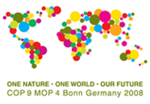23 May 2008: Delegates to the ninth session of the Conference of the Parties to the Convention on Biological Diversity, meeting in Bonn, Germany, considered the CBD’s Subsidiary Body on Scientific, Technical and Technological (SBSTTA) recommendations on biodiversity and climate change (recommendations XII/5 and XIII/6) on Friday, 23 May 2008.
The following is a summary […]

23 May 2008: Delegates to the ninth session of the Conference of the Parties to the Convention on Biological Diversity, meeting in Bonn, Germany, considered the CBD’s Subsidiary Body on Scientific, Technical and Technological (SBSTTA) recommendations on biodiversity and climate change (recommendations XII/5 and XIII/6) on Friday, 23 May 2008. The following is a summary of the deliberations as provided by the Earth Negotiations Bulletin.
The Pacific Islands and Central and Eastern Europe (CEE) supported a bracketed reference to a possible ad hoc technical expert group (AHTEG) with the mandate to develop biodiversity-relevant advice for the UNFCCC and Bali Action Plan, with the African Group welcoming its proposed terms of reference. The EU, supported by Norway, proposed convening two AHTEGs on biodiversity and climate change, one on reducing emissions from deforestation and degradation (REDD) and land-use, land-use change and forestry, and the other on adaptation.
China said the need for an AHTEG has to be carefully assessed. Brazil said the CBD could inform parties on biodiversity aspects of climate change response activities, but modalities for such work require further consideration.
Many emphasized synergies between the Rio conventions, with Mexico stressing the need to recognize their mandates and independence, and China and others stating they should avoid duplication. CEE highlighted regional and international cooperation, including through establishing monitoring systems and scientific models of climate change impacts on biodiversity. The African Group requested the CBD, UNFCCC and Ramsar Convention to analyze funding mechanisms for climate change mitigation and adaptation measures.
The African Group and Costa Rica welcomed the proposed precautionary approach regarding large scale ocean fertilization, while the EU, Norway, Venezuela, The Philippines and others called for a moratorium on in situ ocean fertilization.
Canada called for parties to act in accordance with the London Convention on the prevention of marine pollution, while the ETC Group, the NGO Caucus and IUCN emphasized the need for extreme caution. A coalition of NGOs warned against this and other “false solutions” to climate change.
Cape Verde, for the West African Countries, called for the integration of the three CBD objectives into climate change adaptation and REDD projects through a joint programme of work with the UNFCCC. On REDD, the UN Permanent Forum on Indigenous Issues noted that indigenous peoples do not support its top-down approach, and IUCN called for a pilot phase to draw lessons from the field. The International Indigenous Forum on Biodiversity and the International Forum for Local Communities cautioned against any climate change adaptation and mitigation measures developed without the full and effective participation of indigenous peoples and local communities. Wildlife Conservation International and others prioritized preservation of natural forests. The Global Environment Centre and Wetlands International requested urgent action for the sustainable management of peatlands. Several international organizations presented their relevant programmes and projects. A contact group was established to continue discussions on the issue. [Earth Negotiations Bulletin Meeting Coverage] [CBD]